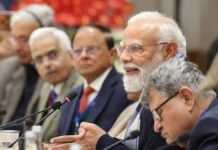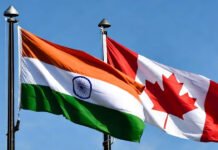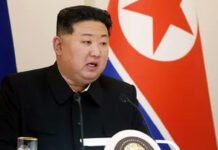Washington, D.C. – In a striking public statement, U.S. Secretary of State Marco Rubio has expressed serious concern over India’s continued purchase of discounted oil from Russia, calling it a significant contributor to Washington’s growing dissatisfaction with New Delhi. Speaking during an interview with a major U.S. media outlet on Thursday, Rubio emphasized that India’s actions are inadvertently aiding Russia in sustaining its military campaign in Ukraine, thereby escalating tensions between the two democratic giants.
India’s Russian Oil Imports: A Strategic or Problematic Move?
India, the world’s third-largest oil consumer, has significantly ramped up purchases of Russian crude oil since 2022, leveraging steep discounts following Western sanctions on Moscow. Rubio criticized this strategy, arguing that by funding Russia’s economy, India is indirectly undermining U.S. efforts to pressure Moscow into ending the conflict in Ukraine.
According to Rubio, “India is helping Russia to continue the fight against Ukraine. President Trump is extremely frustrated with India’s stance. There are multiple sources from which India can fulfill its energy needs, but choosing Russian oil is enabling a war economy.” He went on to explain that Russia has been selling crude at below-market rates, making it an attractive option for cost-sensitive nations like India.
Rubio’s Statement Reflects Deeper Diplomatic Strains
While Rubio acknowledged India’s energy needs, he asserted that economic expediency cannot justify actions that embolden aggressors on the global stage. “India needs a lot of energy to fuel its fast-growing economy,” he said. “But when oil is bought from Russia, that money sustains the machinery of war in Ukraine.”
This comment is not merely an isolated grievance. Rubio made it clear that India’s oil trade with Russia is the foremost issue, but not the only one causing tensions between the U.S. and India. “There are some other issues between us on which there is disagreement,” he remarked without providing further specifics. This signals a broader divergence in geopolitical visions between Washington and New Delhi.
Economic Realities: Why India Chooses Russian Oil
India’s decision to buy Russian oil stems from pure economic calculation. As sanctions have cut off Russia from many Western markets, Moscow has turned eastward, offering oil at significantly discounted rates—in some cases $25–$30 per barrel cheaper than the global benchmark. For a country like India, where energy affordability is a key factor in inflation control and industrial growth, such deals are too lucrative to ignore.
Indian officials have repeatedly stated that their purchases are driven by national interest, not by ideological alignment with Moscow. “We are not violating any sanctions. We buy from where we get the best deal,” Indian External Affairs Minister S. Jaishankar had asserted in past remarks.
Trump’s Discontent with New Delhi’s Position
Rubio’s reference to President Donald Trump’s anger over the situation further underscores the shifting tone in U.S.-India diplomacy. Trump, who has publicly praised India during previous summits, is reportedly frustrated by India’s refusal to align more closely with U.S. interests, especially during critical global crises.
“Trump believes that strategic partners should behave as allies,” said Rubio. “When India buys oil from Russia, it not only helps fund the war, but it sends the wrong signal to the international community.”
Is the U.S. Losing Patience with India?
Rubio’s remarks hint at a broader policy recalibration in Washington. While India has traditionally been seen as a counterbalance to China, its perceived neutrality in the Ukraine war, deepening defense ties with Russia, and non-alignment on critical global votes at the United Nations have irked U.S. lawmakers.
Despite joint military exercises, defense contracts, and growing bilateral trade, frictions are becoming more apparent. The U.S. has made clear its desire for India to take a stronger stance against Russia, aligning itself with the Western-led coalition seeking to isolate Putin diplomatically and economically.
India’s Tightrope Walk: Strategic Autonomy vs. Strategic Partnership
India maintains a long-standing policy of strategic autonomy, refusing to be drawn into military blocs or alliances. This approach, which dates back to the Non-Aligned Movement, allows India to navigate complex international terrains without being tied to the agenda of any one power.
New Delhi’s balancing act is evident in its simultaneous defense cooperation with the U.S., deep energy ties with Russia, and economic partnerships with China. However, this balancing act is being tested in the current geopolitical climate, especially as Western patience wears thin.
Implications for U.S.-India Relations Going Forward
Rubio’s comments serve as a clear warning shot. If India continues its oil imports from Russia at current levels, bilateral relations may cool further, especially under Trump’s leadership. This could have far-reaching implications:
Reduced defense cooperation: Washington may reconsider future technology transfers or joint exercises.
Trade barriers: The U.S. could impose tariffs or restrictions on Indian exports.
Geopolitical trust deficit: India may find itself sidelined in future strategic dialogues if perceived as inconsistent.
At the same time, the Biden-Trump transition, should it occur again, could further alter dynamics. Trump’s foreign policy is expected to be transactional and hard-nosed, meaning India may be expected to deliver concrete alignment in return for continued access to American technology, markets, and political support.
The Broader Energy Puzzle: Global South vs. Global West
Rubio’s critique highlights a growing divide between the Global North and the Global South. Many countries in Asia, Africa, and Latin America have refused to sever ties with Russia despite Western pressure. These nations argue that energy security and economic stability take precedence over what they view as Western-dominated political agendas.
India’s position is emblematic of this worldview. New Delhi insists that affordable energy is non-negotiable, especially when developed nations continue to consume fossil fuels at far higher per capita rates.
Conclusion: A Delicate Moment in U.S.-India Diplomacy
Rubio’s remarks mark a turning point in how the U.S. publicly addresses its concerns with India. While both nations continue to emphasize the strength of their relationship, underlying strategic disagreements are bubbling to the surface. With the Ukraine war showing no signs of abating and with Washington demanding unwavering support, India’s actions will be closely watched in the coming months.
The coming phase in U.S.-India relations may demand greater clarity, compromise, and recalibration from both sides. If New Delhi hopes to retain its unique global position—a partner to the West and a voice of the Global South—it will need to navigate these tensions with extreme precision.
















